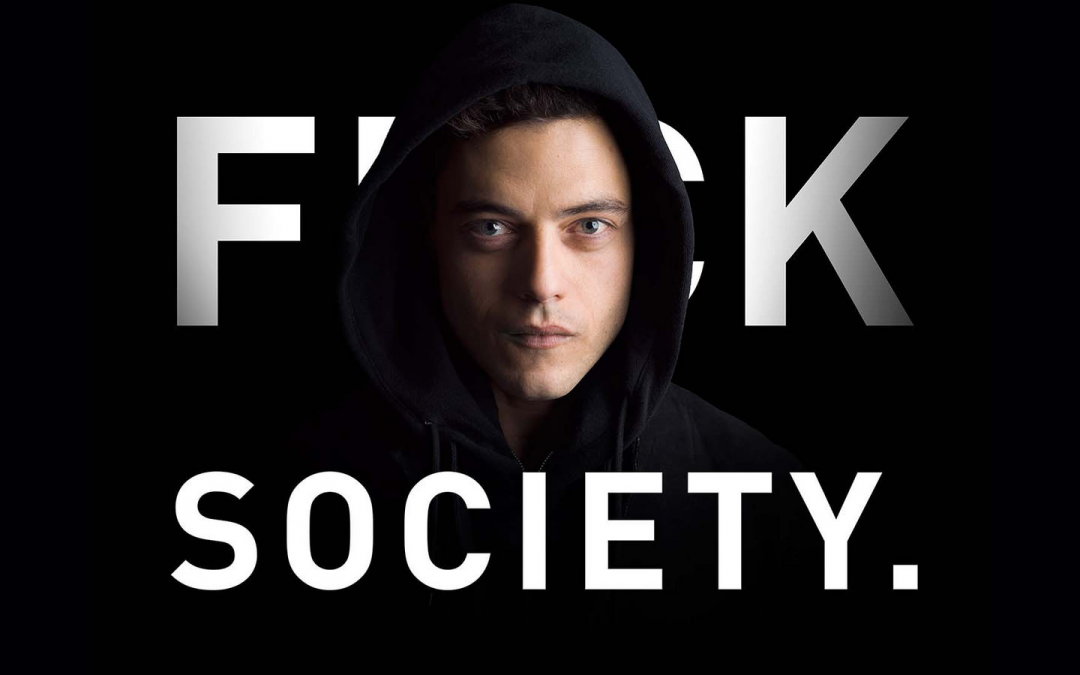 NEWS
NEWS
 NEWS
NEWS
 NEWS
NEWS
We were aware after watching the first few episodes of USA Network’s hacker series Mr. Robot that in terms of a show depicting how computer technology has transformed our lives, for better and sometimes for worse, that we were looking at something groundbreaking. Not only was the hacking itself verisimilitudinous to the point of geeks and hackers everywhere exclaiming that the hacks were as true to life as has ever been seen on TV – oh, how the movie Hackers suddenly looked embarrassingly simplistic and overblown at the same time – but the metanarratives of cultural ennui, vapid consumerism, wealth disparity and the machinations of the few percent that apparently run the world and control the flow of information came at a time when viewers were gagging to see some TV that deconstructed such issues. With that said, we will pick some of the most defining moments of the show.
The superbly crafted, monotone hacker, Elliot Alderson (Rami Malek), tells us in the very first moments of episode 1 that, “There’s a powerful group of people running the world.” We then see Alderson tell a stranger in a café that he has been busy hacking him. “I own everything,” says Alderson, “all your emails, all your files, all your … pics,” much of which consists of child pornography. “I understand what it’s like to be different; I’m very different too,” Alderson tells his captor, and as the social justice hacker exits the scene, the police arrive outside the café.
One of the truly great things about Alderson, we quickly realize, is that he is not the kind of do-gooder that is compelled to do what he does because of a spirit of optimism. He seems eternally lost, and spending much of his time looking through the secrets of others he is privy to some of the darker sides to human nature. He is a flawed hero, as all heroes should be. In Alderson’s eyes, we, society, are too caught up in our own consumerist attachments to even care about the horrors, little and large, that exist in our society. This is exemplified in the following soliloquy:
“The world itself is just one big hoax. Spamming each other with our commentary bullshit masquerading as insight. Our social media faking us into intimacy, or is that we voted for this? Not with our rigged elections, but with our things, our property, our money. I’m not saying anything new; we all know why we do this. Not because Hunger Games books make us happy, but because we want to be sedated. Because it’s painful not to pretend, because we’re cowards. Fuck Society.”
Mostly due to this scene, many critics, including us, made the comparison with Chuck Palahniuk’s book Fight Club (later turned into a movie). While such cynicism can be a welcome break when we see it, and even uplifting as a counter-movement, it did seem for a while that Mr. Robot lacked something in terms of originality. The drug scenes, too, albeit with heroin supplanted by morphine and Oxycontin, seemed like they were sometimes taken right from the film Trainspotting.
But something happened, something original in itself, that showed us that Mr. Robot was well aware of what viewers and critics were thinking. “You knew all along, didn’t you?” says Alderson to the viewer, and in the background a Maxence Cyrin rendition of the Pixies song, Where Is My Mind (the track made famous by Flight Club) plays. The series becomes self-conscious; we are reminded that the creators knew what we were thinking, just as Alderson becomes aware that we knew he had a dual personality similar to the main character in Flight Club.
In this interview with EW, series creator Sam Esmail explains that he did not have any scruples about taking so much from Fight Club. Esmail says, “I make no apologies. Fight Club was one of my big inspirations for the show. I think the nod or the acknowledgement with ‘Where Is My Mind’ at the end of episode 9 was, yes, in part letting the audience know that we’re very much aware that Fight Club was an inspiration, but at the same time, we make no apologies about it.”
To admit that Mr. Robot borrowed much of its context from Esmail’s influences only strengthened the series. As viewers we were asked to suspend belief, i.e., be consumed by the reality of the show, but also accept that the show itself was telling us that it didn’t mind us knowing that it had borrowed from other fictions.
If anything, this and the time spent earnestly realizing true-to-life hacking shows us how committed Mr. Robot was/is to being honest. How many other tech-related shows get close to being this sincere, so painfully accurate in terms of technology and also totally committed to making the characters in the caper so life-like? As other tech shows this year have shown us, for instance Fox’s deplorably bad Minority Report, when technology is depicted in film or television, often attempting to understand how technology shapes society or creating realistic characters that move us to empathy goes out of the window. So often when technology is portrayed on screen we seem to forget who we are. There are many great things to say about Mr. Robot, but the fact it knows what it is, is the best we can say.
Support our mission to keep content open and free by engaging with theCUBE community. Join theCUBE’s Alumni Trust Network, where technology leaders connect, share intelligence and create opportunities.
Founded by tech visionaries John Furrier and Dave Vellante, SiliconANGLE Media has built a dynamic ecosystem of industry-leading digital media brands that reach 15+ million elite tech professionals. Our new proprietary theCUBE AI Video Cloud is breaking ground in audience interaction, leveraging theCUBEai.com neural network to help technology companies make data-driven decisions and stay at the forefront of industry conversations.